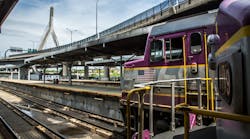MBTA commuter rail could be electrified for between $800 million and $1.5 billion according to new report
A report published by TransitMatters, a transit advocacy organization for the Boston area, makes the case for electrifying Massachusetts Bay Transportation Authority’s (MBTA) commuter rail network, saying the investment could improve trip times, operating expenditures and reduce the transportation mode’s carbon footprint.
Using international best practices as a cost basis, the report estimates electrification of the network could be done with an investment of between $800 million and $1.5 billion.
The report’s authors say, “Electrification is among the most beneficial investments that major suburban railroads can undertake.”
"Electrifying our rail network would be a win for everyone in the region," said Jarred Johnson, TransitMatters executive director. "People from Lowell or Dorchester will get faster rides into Boston and people in Dorchester and Roxbury will have fewer toxic fumes in their neighborhoods. Teamed with better service, electrification will get people out of cars and open up opportunities for housing."
The report recommends an overhead catenary system, as well as the use of electric multiple units (EMUs), both proven solutions that make electrification “off-the-shelf implementation” rather than a “bespoke project.”
“EMUs outperform other trains in every respect: speed, acceleration, energy consumption, passenger comfort, operating costs, reliability, procurement costs and maintenance costs,” the report states. “Combined, these allow electric trains to cover routes more quickly, and allow significantly more service to be provided with the same number of resources.”
Electrification of the commuter rail network was the focus of MBTA’s Rail Vision team, which published a final Rail Vision report in February 2020 following a study to identify cost-effective strategies to improve mobility and economic competitiveness of the commuter rail network.
The Rail Vision report estimated a full transformation with higher frequency service, the purchase of EMUs and electrification of the network would carry preliminary capital costs of approximately $29 billion with annual operations and maintenance costs of $643 million. This cost estimate includes the addition of 964 electric vehicles, improved stations and tracks and added accessibility at all stations.
MBTA’s existing network operates using diesel locomotives and TransitMatters’ report cost estimate does not include the purchase of EMUs, service extensions or infrastructure improvements such as station platform work.
While TransitMatters’ report says electrification is a “straightforward investment,” it recognizes three challenges for Boston’s network:
- Adequate construction windows to take advantage of low-cost construction;
- Possible community opposition to wires; the report believes engagement within the Boston community will be positive, but advises a robust outreach and engagement effort be planned; and
- Integrating electrification with other ongoing projects; for example, track upgrades and high-platform station rebuilds are being done with futureproofing for electrification.
The report taps into international best practices from successful projects in Israel, Denmark, Norway and Britain and recommends that staff hired for any future electrification project should have direct experience with successful projects and must be hired in-house.
“In order to do the hard and necessary work of providing the transit that Metro Boston requires to thrive, our planning processes need to imitate the ones that deliver the best results around the world,” the report concludes.
The full TransitMatters report is available through the organization’s website.

Mischa Wanek-Libman | Group Editorial Director
Mischa Wanek-Libman is director of communications with Transdev North America. She has more than 20 years of experience working in the transportation industry covering construction projects, engineering challenges, transit and rail operations and best practices.
Wanek-Libman has held top editorial positions at freight rail and public transportation business-to-business publications including as editor-in-chief and editorial director of Mass Transit from 2018-2024. She has been recognized for editorial excellence through her individual work, as well as for collaborative content.
She is an active member of the American Public Transportation Association's Marketing and Communications Committee and served 14 years as a Board Observer on the National Railroad Construction and Maintenance Association (NRC) Board of Directors.
She is a graduate of Drake University in Des Moines, Iowa, where she earned a Bachelor of Arts degree in Journalism and Mass Communication.



